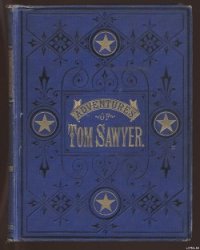Английский язык с Марком Твеном. Принц и нищий (Mark Twain. The Prince and the Pauper) - Twain Mark (читать хорошую книгу полностью .txt) 📗
When the illustrious maidens were gone, Tom turned wearily to his keepers and said:
'May it please your lordships to grant me leave to go into some corner and rest me!'
Lord Hertford said:
'So please your highness, it is for you to command, it is for us to obey. That thou shouldst rest, is indeed a needful thing, since thou must journey to the city presently.'
He touched a bell and a page appeared, who was ordered to desire the presence of Sir William Herbert. This gentleman came straightway, and conducted Tom to an inner apartment. Tom's first movement there was to reach for a cup of water; but a silk-and-velvet servitor seized it, dropped upon one knee, and offered it to him on a golden salver.
Next, the tired captive sat down and was going to take off his buskins, timidly asking leave with his eye, but another silk-and-velvet discomforter went down upon his knees and took the office from him. He made two or three further efforts to help himself, but being promptly forestalled each time, he finally gave up, with a sigh of resignation and a murmured 'Beshrew me, but I marvel they do not require to breathe for me also!' Slippered, and wrapped in a sumptuous robe, he laid himself down at last to rest, but not to sleep, for his head was too full of thoughts and the room too full of people. He could not dismiss the former, so they stayed; he did not know enough to dismiss the latter, so they stayed also, to his vast regret — and theirs.
Tom's departure (уход Тома) had left his two noble guardians alone (оставил его двух благородных стражей одних). They mused awhile (они находились в задумчивости некоторое время), with much headshaking (с покачиваниями головой; to shake — трясти) and walking the floor (и ходьбой туда-сюда; floor — пол), then Lord St. John said (затем лорд Сент-Джон сказал):
'Plainly (итак, по совести; plain — плоский, ровный; очевидный, явный, ясный), what dost thou think (что ты думаешь)?'
'Plainly, then, this (откровенно, значит, вот что). The king is near his end (король близок к концу), my nephew is mad (мой племянник безумен), mad will mount the throne (безумным взойдет на трон; to mount — вскарабкаться, забраться), and mad remain (и безумным останется). God protect England (защити Бог Англию), since she will need it (ибо она будет нуждаться в этом; to need — нуждаться)!'
'Verily it promiseth so (истинно это обещает (быть) так; to promise — обещать), indeed (действительно). But (но)... have you no misgivings (не имеешь ли ты дурных предчувствий) as to... as to... (касательно… касательно…)'
The speaker hesitated (говорящий запнулся), and finally stopped (и наконец остановился = замолк). He evidently felt (он, очевидно, почувствовал; to feel — чувствовать) that he was upon delicate ground (что он ступил на деликатную территорию). Lord Hertford stopped before him (лорд Хартфорд остановился перед ним), looked into his face with a clear, frank eye (посмотрел ему в лицо ясным, прямым взглядом: «глазом»), and said (и сказал):
'Speak on (говори дальше = продолжай) — there is none to hear but me (некому услышать, кроме меня). Misgivings as to what (предчувствий касательно чего)?'
'I am loath (мне не хочется: «я есть нежелающий») to word the thing that is in my mind (высказать вещь, которая у меня на уме), and thou so near to him in blood (а ты так близок ему по крови), my lord (милорд). But craving pardon (но будучи жаждущим прощения) if I do offend (если я все-таки нанесу оскорбление; to offend — обидеть, оскорбить), seemeth it not strange (не кажется ли странным) that madness could so change his port and manner (что безумие могло бы так изменить его повадку и манеру держаться)! — not but that his port and speech are princely still (не то что бы его манера и речь не были все еще достойны принца), but that they differ in one unweighty trifle or another (но что они отличаются в том или ином незначительном пустяке), from what his custom was aforetime (от /того/, каким его обыкновение было раньше). Seemeth it not strange (не кажется ли это странным) that madness should filch from his memory (чтобы его безумие похитило = стерло из его памяти) his father's very lineaments (самые черты (лица) его отца); the customs and observances (обычаи и знаки внимания) that are his due (которые ему подобают) from such as be about him (от тех кто суть вокруг него = окружают его); and, leaving him his Latin (и, оставив ему его латынь), strip him of his Greek and French (лишило его его греческого и французского)? My lord (милорд), be not offended (не обижайся = не будь оскорблен), but ease my mind of its disquiet (но облегчи мой разум от его беспокойства) and receive my grateful thanks (и прими мои благодарности; grateful — благодарный; thanks — благодарность). It haunteth me (это преследует меня = мысль), his saying he was not the prince (его слова, что он не принц), and so (и так) —'
'Peace, my lord (замолчи, милорд), thou utterest treason (ты произносишь крамолу: «измену»)! Hast forgot the king's command (ты забыл приказание короля)? Remember I am party to thy crime (помни, что я соучастник твоего преступления), if I but listen (/даже/ если я только послушаю).'
St. John paled (Сент-Джон побледнел), and hastened to say (и поспешил сказать = поспешно сказал):
'I was in fault (я был виновен; fault — вина), I do confess it (я действительно признаю это). Betray me not (не выдавай меня), grant me this grace out of thy courtesy (даруй мне эту милость из твоей любезности), and I will neither think nor speak of this thing more (и я не буду ни думать, ни говорить об этой вещи больше). Deal not hardly with me, sir (не поступай со мной жестоко), else am I ruined (иначе я погиб).'
'I am content (я удовлетворен), my lord (милорд). So thou offend not again (так что ты не совершай проступка снова), here or in the ears of others (здесь или перед другими: «в ушах других»), it shall be as though thou hadst not spoken (будет так, как если бы ты не говорил). But thou needst not have misgivings (но тебе не нужно иметь подозрений). He is my sister's son (он сын моей сестры); are not his voice, his face, his form, familiar to me from his cradle (разве его голос, его лицо, его облик не знакомы мне с его колыбели = с тех пор, как он был младенцем)? Madness can do all the odd conflicting things thou seest in him (безумие может совершить все странные противоречивые вещи, (которые) ты видишь в нем), and more (и (даже) больше). Dost not recall (не вспоминаешь ли ты) how that the old Baron Marley (как старый барон Марли), being mad (будучи сумасшедшим), forgot the favor of his own countenance (забыл внешность своего лица) that he had known for sixty years (которую он знал 60 лет), and held it was another's (и полагал: «держал» (что) оно было чужим/принадлежало другому; to hold — держать); nay (нет — устар.), even claimed (даже утверждал) he was the son of Mary Magdalene (что он сын Марии Магдалины), and that his head was made of Spanish glass (и чт его голова сделана из испанского стекла); and sooth to say (и, по правде сказать), he suffered none to touch it (он не выносил, чтобы кто-либо к ней прикасался; to suffer — страдать, переносить), lest by mischance some heedless hand might shiver it (чтобы по случайности какая-нибудь неосторожная рука не могла разбить ее вдребезги; lest — чтобы не; mischance — несчастный случай; shiver — дрожать, разбивать вдребезги). Give thy misgivings easement (дай своим подозрениям облегчение = не мучай себя подозрениями), good my lord (мой добрый лорд). This is the very prince (это настоящий принц), I know him well (я знаю его хорошо) — and soon will be thy king (и скоро будет твоим королем); it may advantage thee (это может принести тебе пользу) to bear this in mind (носить это в уме = держат в голове) and more dwell upon it than the other (и больше задерживаться (мыслями) на этом, чем на другом; to dwell — останавливаться, задерживаться, жить, обитать).'




